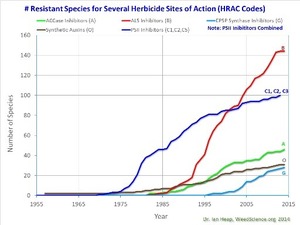Roundup doesn’t work too well….
And this is not our corn; this patented seed corn is on Bemiss Road north of Valdosta, GA.
 With GM crops come herbicides, which breed resistant weeds.
This has happened in about a decade for the worse mutants.
We can reverse the problem by reversing the spraying,
using plowing, cultivation, and crop rotation instead.
With GM crops come herbicides, which breed resistant weeds.
This has happened in about a decade for the worse mutants.
We can reverse the problem by reversing the spraying,
using plowing, cultivation, and crop rotation instead.
Mark Jeschke wrote for Pioneer Dupont, Crop Insights: Weed Management in the Era of Glyphosate Resistance, Continue reading
Likely effects of dousing 90+% of all corn, soybeans, peanuts, and cotton grown in Georgia (and elsewhere) in Roundup and other toxic chemicals, often drifting onto other people’s land, schools, shops, and churches. It’s not that hard to grow the same crops without those poisons and without the toxic seeds that require them; not that hard and more profitable.
Yes, I know Jeffrey M. Smith is not a biological scientist or medical doctor. But many of the sources he cites are.
Posted by MyScienceAcademy 29 November 2013, GMOs linked to gluten disorders plaguing 18 million Americans – report
The IRT release also indicated that glyphosate, a weed killer sold under the brand name ‘Roundup’ was also found to have a negative effect on intestinal bacteria. GMO crops contain high levels of the toxin at harvest.
“Even with minimal exposure, glyphosate can significantly reduce the population of beneficial gut bacteria and promote the overgrowth of harmful strains,” the report found.
Continue reading
Will we listen to French farmer Paul François, who sued Monsanto for nerve damage due to inhaling Lasso weedkiller, and won last year? Monsanto appealed, but François just won
“Farmers need to understand that those who speak for them are businessmen who defend other interests, very lucrative for the businessmen, who do not care about farmers’ health or the health of those around us.”the appeal, too. Now the court is gauging losses to determine penalties for Monsanto.
 This after back in 2009
France convicted Monsanto of lying
about its claims that Roundup was “biodegradable” and “left the soil clean”.
And Argentinean tobacco farmers
are suing Monsanto in New Castle County Court, Delaware, saying
Monsanto
“knowingly poisoned them with herbicides and pesticides and subsequently caused ”devastating birth defects” in their children”.
These same Monsanto herbicides and pesticides are sprayed
on most fields around here, and they’re just as much
poisons here as in Argentina or France.
This after back in 2009
France convicted Monsanto of lying
about its claims that Roundup was “biodegradable” and “left the soil clean”.
And Argentinean tobacco farmers
are suing Monsanto in New Castle County Court, Delaware, saying
Monsanto
“knowingly poisoned them with herbicides and pesticides and subsequently caused ”devastating birth defects” in their children”.
These same Monsanto herbicides and pesticides are sprayed
on most fields around here, and they’re just as much
poisons here as in Argentina or France.
Paul François answered questions from Pierre Penin for Sud Ouest (southwest France) 8 February 2013,
Continue readingThere’s quite the controversy about that recent study that shows that “inert” ingredients in Roundup are actually toxic. Apparently Dr. Séralini hit a nerve.
Some critics are making up stuff:
“The EFSA requested access to the raw data” —Jon Entine
That turns out not to be true:
No. EFSA has not requested raw data for the study as this information is not required at this stage of the review process.” —EFSA.
 Who previously actually did refuse to release raw data?
Who previously actually did refuse to release raw data?
Monsanto only released the raw data after a legal challenge from Greenpeace, the Swedish Board of Agriculture and French anti-GM campaigners.
Here’s the European Food Safety Authority (EFSA)’s rather vague statement about the recent study and EFSA’s FAQ clarifying that statement.
Here’s a much more substantive response from scientists supporting the Séralini cell toxicity study. The last item of that response:
CRITICISM: GM has been in the food chain for years in the US. Why isn’t there evidence of people and animals suffering more tumours or dying earlier? Why aren’t Americans “dropping like flies?”
RESPONSE: Most GM crops are fed to farm animals, which have relatively short lives either for meat or dairy production and so there is probably not enough time for tumours to develop.
Americans have been eating GM food (soya, maize) for only a relatively short time in significant quantities in processed foods. So it may be too short a period for long-term effects such as tumour formation to be noticeable. However, we should also note that there is no labelling of GM foods in the USA and no monitoring of the population for ill-effects, so if GM food were causing ill health this would be going undetected.
Ill effects of Roundup went mostly unstudied until scientists in places like Austria (the first study above) and France (the second study) and Canada and Continue reading
 Roundup (you know, the stuff that’s sprayed on cotton, soybeans,
peanuts, and corn and drifts across the road) causes DNA damage
even when diluted down to 450 times less than what’s used in agriculture,
according to a scientific study from February 2012.
Roundup (you know, the stuff that’s sprayed on cotton, soybeans,
peanuts, and corn and drifts across the road) causes DNA damage
even when diluted down to 450 times less than what’s used in agriculture,
according to a scientific study from February 2012.
Cytotoxic and DNA-damaging properties of glyphosate and Roundup in human-derived buccal epithelial cells, by Verena J. Koller, Maria Fürhacker, Armen Nersesyan, Miroslav Mišík, Maria Eisenbauer and Siegfried Knasmueller, Archives of Toxicology Volume 86, Number 5 (2012), 805-813, DOI: 10.1007/s00204-012-0804-8.
Glyphosate (G) is the largest selling herbicide worldwide; the most common formulations (Roundup, R) contain polyoxyethyleneamine as main surfactant. Recent findings indicate that G exposure may cause DNA damage and cancer in humans….
Since we found genotoxic effects after short exposure to concentrations that correspond to a 450-fold dilution of spraying used in agriculture, our findings indicate that inhalation may cause DNA damage in exposed individuals.
It’s probably not even the “active” ingredient, glyphosate, that’s causing this DNA damage, more likely one of its “inert” ingredients.
Sayer Ji wrote for Greenmedinfo 15 October 2012, Research: Roundup Herbicide Toxicity Vastly Underestimated,
Continue readingWe already knew Argentinian farmers were suing Monsanto about Roundup-induced birth defects, including cerebral palsy, down syndrome, psychomotor retardation, missing fingers, and blindness; we knew Roundup’s active ingredient glyphosate was “a risk factor for developing Non-Hodgkin lymphoma”; we knew that Roundup-ready corn causes liver and kidney damage in rats and chickens fed feed including Monsanto corn show abnormal gene expression, and we knew that Roundup-ready corn is toxic to humans. Add to all that: Roundup is a risk for Parkinson’s disease.
Sayer Ji wrote for GreenMediaInfo 18 April 2012, Roundup Herbicide Linked To Parkinson’s-Related Brain Damage,
Continue readingAlarming new research published in the journal Neurotoxicology and Teratology
supports the emerging connection between glyphosate, the active ingredient in Roundup herbicide, and neurodegenerative conditions such as Parkinson’s disease and Parkinsonian disorders.
Published this month (April, 2012), the new study entitled “Glyphosate induced cell death through apoptotic and authophagic mechanisms,” investigated the potential brain-damaging effects of herbicides, which the authors stated “have been recognized as the main environmental factor associated with neurodegenerative disorders, such as Parkinson’s disease.”1
They found that glyphosate inhibited the viability of differentiated test cells (PC12, adrenal medula derived), in both dose-and-time dependent manners. The researchers also found that “glyphosate induced cell death via authophagy pathways in addition to activating apoptotic pathways.”
Roundup herbicide is now a ubiquitous contaminant in our air, rain, groundwater, and food, making complete avoidance near impossible. A growing body of experimental evidence now indicates that it in addition to its neurotoxicity it also has the following.
Modes of Toxicity
Got enough Roundup and Paraquat drifting onto you? Want some 2,4-D with that? If not, you can send your comments to USDA now. Hey, what if we all plowed under the mutant pigweed instead of breeding more with poison soup!
Tom Philpott wrote for Mother Jones 18 July 2012, USDA Prepares To Greenlight Gnarliest GMO Soy Yet,
In early July, on the sleepy Friday after Independence Day, the USDA
quietly signaled its intention to greenlight a new genetically engineered soybean seed from Dow AgroSciences. The product is designed to produce soy plants that withstand 2,4-D, a highly toxic herbicide (and, famously, the less toxic component in the notorious Vietnam War-era defoliant Agent Orange).
Readers may remember that during an even-sleepier period—the week between Christmas and the New Year—the USDA made a similar move on Dow’s 2,4-D-ready corn.
If the USDA deregulates the two products—as it has telegraphed its intention to do—Dow will enjoy a massive profit opportunity. Every year, about half of all US farmland is planted in corn and soy. Currently, Dow’s rival Monsanto has a tight grip on weed management in corn-and-soy country. Upwards of 90 percent of soy and 70 percent of corn is engineered to withstand another herbicide called glyphosate through highly profitable Monsanto’s Roundup Ready seed lines. And after so many years of lashing so much land with the same herbicide, glyphosate-resistant superweeds are now vexing farmers and “alarming” weed-control experts throughout the midwest.
And that’s where Dow’s 2,4-D-ready corn and soy seeds come in. Dow’s novel products will be engineered to withstand glyphosate and 2,4-D, so farmers can douse their fields with both herbicides; the 2,4-D will kill the weeds that glyphosate no longer can. That’s the marketing pitch, anyway.
There’s more in the article.
It can also get into your well water, and then, according to EPA:
Continue readingDaniel Charles wrote for The Salt 11 March 2012, Why Monsanto Thought Weeds Would Never Defeat Roundup,
First, the company had been selling Roundup for years without anySo they thought small scale would be the same as saturating 90+% of every corn, soybean, peanut, and cotton field in the U.S. and numerous other countries with virulent poisons. Because they wanted the money.problems. Second, and perhaps most important, the company’s scientists had just spent more than a decade, and many millions of dollars, trying to create the Roundup-resistant plants that they desperately wanted — soybeans and cotton and corn. It had been incredibly difficult. When I interviewed former Monsanto scientists for my book on biotech crops, one of them called it the company’s “Manhattan Project.”
Considering how hard it had been to create those crops, “the thinking was, it would be really difficult for weeds to become tolerant” to Roundup, says Rick Cole, who is now responsible for Monsanto’s efforts to deal with the problem of resistant weeds.
-jsq
Michelle Schoffro Cook wrote for care2 1 February 2012, Monsanto Wins Worst Company of 2011 Award,
The article gives plenty of reasons, and that was even before the recent hard evidence that both Monsanto’s GM corn and Monsanto’s Roundup are toxic to humans.Natural Society has awarded Monsanto the Worst Company of 2011 award for its ongoing work to threaten human health and the environment. Currently responsible for 90 percent of all genetically-modified (GM) seed in the US, the biotechnology giant is also the leader in developing genetically-modified (GM) seeds and the resulting crops worldwide. But Monsanto is perhaps best known for its herbicide Roundup, which many experts link to soil damage and herbicide-resistant superweeds, not to mention potential health problems.
Why do people keep growing that stuff around here and spraying Roundup on it?
-jsq